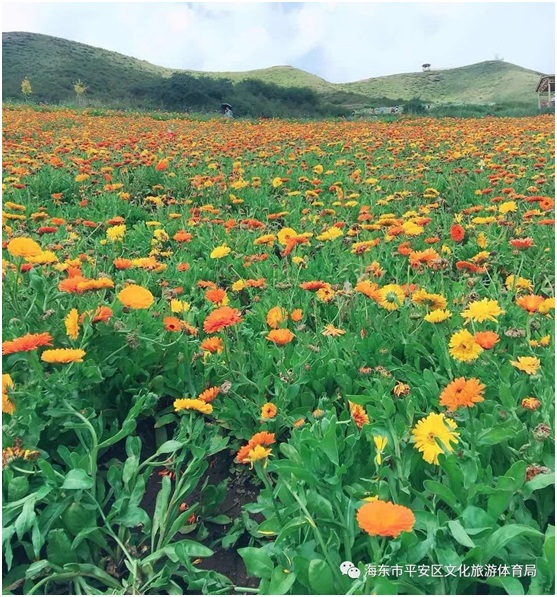By Wang Mei, People’s Daily
In June, Shibei village in Northwest China’s Qinghai Province gets busy as tourists flock to scenic sites there every day and cars wait to enter a scenic spot to see the sea of flowers.
Rural tourism has become a poverty alleviation tool for villagers of Shibei, Gucheng Hui Autonomous Township, Ping’an district, Haidong city, Qinghai.
Getting its name from a stone tablet, Shibei is a beautiful ancient village of ethnic minorities. Though it is endowed with clear waters and green mountains, the village was impoverished in the past.
To help the villagers out of poverty, the local government invested 5.6 million yuan ($791,500) to develop rural tourism based on the resources it has, such as natural ecology and folk culture.
The village provides tourism services such as sightseeing, catering and accommodation. In addition, the local government has endeavored to make the village more beautiful, improved supporting services, launched entertainment projects with countryside characteristics such as farming and hiking, and developed characteristic rural tourism. The measures have expanded the income channels of the residents.
Thanks to the rural tourism project, Shibei village has been lifted out of poverty, with the per capita disposable income of registered poor households increasing to 5,500 yuan in 2017 from 2,429 yuan in 2015.
The villagers have established seven agritainment resorts, generating about 30 jobs, said Ma Chengquan, secretary of the Communist Party of China (CPC) branch at Shibei village.
The village is expected to receive 120,000 tourists this year, bringing an average income of 2,300 yuan to each villager, Ma noted.
The local government also encourages the villagers to open shops and snack bars and develop farm stay business.
A villager named Ma Xiaoyu said she could earn 300 yuan every day by selling yogurt and snacks in the scenic areas. While doing the business, she could also take care of her child.
The rapid development of the village attracted some villagers who had worked in the cities to come back to start up businesses, which created more opportunities for the local economy.
“I used to run a noodle restaurant in a developed coastal area of the country, and earned a lot of money. Last year, I came back to the village and opened an agritainment resort covering 500 square meters. Now, I earn as much as I did in the past,” said Ma Shouqing, a villager in Shibei.
Shibei village invested 500,000 yuan of collective development funds in the scenic areas to purchase recreational facilities, bringing 40,000 yuan of income to the village every year.
Together with the dividends of the project, the village could gain 181,600 yuan every year for developing collective economy, providing seasonal jobs for more than 80 rural households and increasing the per capita income of villagers involved by over 2,000 yuan.
The development of collective economy has made villagers more optimistic about future life and made them realize that lucid waters and lush mountains are invaluable assets. The residents would volunteer to clean the scenic areas on a regular basis.
With the continuous efforts to build a beautiful village and improve the living environment, Shibei village has taken on a new look and become one of the important rural tourist attractions in Ping’an district, according to Che Guiping, secretary of the CPC committee of Gucheng township.
The village has risen to fame and attracted more and more tourists and the per capita income of villagers stood at 13,256 yuan in 2019, Che added.
  |
| Photo shows a flower-themed scenic area in Shibei village. (Photo courtesy of the Bureau of Culture, Tourism and Sports of Ping’an district, Haidong city, Qinghai Province |









Leave a Comment